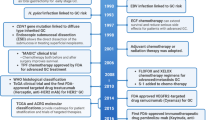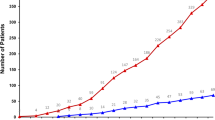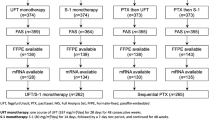Abstract
In gastric cancer, available clinical studies focusing on the activated hepatocyte growth factor (HGF)/MET pathway are limited to surgical and often heterogeneous series. MET copy number gain (CNG) and an activating truncation in the HGF promoter (deoxyadenosine tract element, DATE+) were studied in tumors of 95 patients with advanced gastric cancer treated with palliative chemotherapy. Associations with overall survival (OS) and the pattern of metastatic disease were studied. Median OS was 9.7 months in 80 MET CNG <5 copies cases (MET−), and 6.4 months in 15 MET CNG was ⩾5 copies cases (MET+) (P=0.001). MET+ status confirmed the adverse prognostic effect in the multivariate model. A significantly different distribution of MET+/DATE+ and MET−/DATE− cases was observed between patients with and without peritoneal carcinomatosis (PC). MET+ status confirms its adverse prognostic role in advanced gastric cancer patients. The activated MET/HGF axis seems to be associated with PC. These findings are relevant to the development of anti-MET/HGF compounds.
This is a preview of subscription content, access via your institution
Access options
Subscribe to this journal
Receive 6 print issues and online access
$259.00 per year
only $43.17 per issue
Buy this article
- Purchase on Springer Link
- Instant access to full article PDF
Prices may be subject to local taxes which are calculated during checkout



Similar content being viewed by others
References
Trusolino L, Bertotti A, Comoglio PM . MET signalling: principles and functions in development, organ regeneration and cancer. Nat Rev Mol Cell Biol 2010; 11: 834–848.
Peters S, Adjei AA . MET: a promising anticancer therapeutic target. Nat Rev Clin Oncol 2012; 9: 314–326.
Niemann HH . Structural insights into Met receptor activation. Eur J Cell Biol 2011; 90: 972–981.
Wadhwa R, Song S, Lee JS, Yao Y, Wei Q, Ajani JA . Gastric cancer-molecular and clinical dimensions. Nat Rev Clin Oncol 2013; 10: 643–655.
Yu S, Yu Y, Zhao N, Cui J, Li W, Liu T . c-Met as a prognostic marker in gastric cancer: a systematic review and meta-analysis. PLoS ONE 2013; 8: e79137.
Lennerz JK, Kwak EL, Ackerman A, Michael M, Fox SB, Bergethon K et al. MET amplification identifies a small and aggressive subgroup of esophagogastric adenocarcinoma with evidence of responsiveness to crizotinib. J Clin Oncol 2011; 29: 4803–4810.
Catenacci DV, Henderson L, Xiao SY, Patel P, Yauch RL, Hegde P et al. Durable complete response of metastatic gastric cancer with anti-Met therapy followed by resistance at recurrence. Cancer Discov 2011; 1: 573–579.
Yap TA, Olmos D, Brunetto AT, Tunariu N, Barriuso J, Riisnaes R et al. Phase I trial of a selective c-MET inhibitor ARQ 197 incorporating proof of mechanism pharmacodynamic studies. J Clin Oncol 2011; 29: 1271–1279.
Oliner KS, Tang R, Anderson A, Lan Y, Iveson T, Donehower RC et al. Evaluation of MET pathway biomarkers in a phase II study of rilotumumab (R, AMG 102) or placebo (P) in combination with epirubicin, cisplatin, and capecitabine (ECX) in patients (pts) with locally advanced or metastatic gastric (G) or esophagogastric junction (EGJ) cancer. J Clin Oncol 2012; 30 (Suppl): (abstract 4005).
Catenacci DV, Cervantes G, Yala S, Nelson EA, El-Hashani E, Kanteti R et al. RON (MST1R) is a novel prognostic marker and therapeutic target for gastroesophageal adenocarcinoma. Cancer Biol Ther 2011; 12: 9–46.
Toiyama Y, Yasuda H, Saigusa S, Matushita K, Fujikawa H, Tanaka K et al. Co-expression of hepatocyte growth factor and c-Met predicts peritoneal dissemination established by autocrine hepatocyte growth factor/c-Met signaling in gastric cancer. Int J Cancer 2012; 130: 2912–2921.
Zhao L, Yasumoto K, Kawashima A, Nakagawa T, Takeuchi S, Yamada T et al. Paracrine activation of MET promotes peritoneal carcinomatosis in scirrhous gastric cancer. Cancer Sci 2013; 104: 1640–1646.
Park WS, Oh RR, Kim YS, Park JY, Shin MS, Lee HK et al. Absence of mutations in the kinase domain of the Met gene and frequent expression of Met and HGF/SF protein in primary gastric carcinomas. APMIS 2000; 108: 195–200.
Lee HE, Kim MA, Lee HS, Jung EJ, Yang HK, Lee BL et al. MET in gastric carcinomas: comparison between protein expression and gene copy number and impact on clinical outcome. Br J Cancer 2012; 107: 325–333.
Lee J, Seo JW, Jun HJ, Ki CS, Park SH, Park YS et al. Impact of MET amplification on gastric cancer: possible roles as a novel prognostic marker and a potential therapeutic target. Oncol Rep 2011; 25: 1517–1524.
Ha SY, Lee J, Kang SY, DO IG, Ahn S, Park JO et al. MET overexpression assessed by new interpretation method predicts gene amplification and poor survival in advanced gastric carcinomas. Mod Pathol 2013; 26: 1632–1641.
Graziano F, Galluccio N, Lorenzini P, Ruzzo AM, Canestrari E, D’Emidio S et al. Genetic activation of the MET pathway and prognosis of patients with high-risk, radically resected gastric cancer. J Clin Oncol 2011; 29: 4789–4795.
Ma J, Defrances MC, Zou C, Johnson C, Ferrell R, Zamegar R . Somatic mutation and functional polymorphism of a novel regulatory element in the HGF gene promoter causes its aberrant expression in human breast cancer. J Clin Invest 2009; 119: 478–491.
Catalano V, Graziano F, Santini D, D’Emidio S, Baldelli AM, Rossi D et al. Second-line chemotherapy for patients with advanced gastric cancer: who may benefit? Br J Cancer 2008; 99: 1402–1407.
Mallett S, Timmer A, Sauerbrei W, Altman DG . Reporting of prognostic studies of tumour markers: a review of published articles in relation to REMARK guidelines. Br J Cancer 2010; 102: 173–180.
Han SU, Lee HY, Lee JH, Kim WH, Nam H, Kim H et al. Modulation of E-cadherin by hepatocyte growth factor induces aggressiveness of gastric carcinoma. Ann Surg 2005; 242: 676–683.
Jiang WG, Davies G, Martin TA, Parr C, Mason MD, Jenkins SA et al. The potential lymphangiogenic effects of hepatocyte growth factor/scatter factor in vitro and in vivo. Int J Mol Med 2005; 16: 723–728.
Trusolino L, Cavassa S, Angelini P, Andò M, Bertotti A, Comoglio PM et al. HGF/scatter factor selectively promotes cell invasion by increasing integrin avidity. FASEB J 2000; 14: 1629–1640.
Crouch S, Spidel CS, Lindsey JS . HGF and ligation of alphavbeta5 integrin induce a novel, cancer cell-specific gene expression required for cell scattering. Exp Cell Res 2004; 292: 274–287.
Hartgrink HH, Jansen EP, van Grieken NC, van de Velde CJ . Gastric cancer. Lancet 2009; 374: 477–490.
Catenacci D, Henderson L, Liao W, Burrows J, Hembrough T . KRAS gene amplification defines a distinct molecular subgroup of gastroesophageal adenocarcinoma that may benefit from combined anti-MET/AKT therapy. AACR 2012 Breakthroughs in Basic and Translational Cancer Research Maui Hawai. Cancer Res 2013, (abstract 141239).
Hembrough T, Liao W, Henderson L, Xu P, Burrows J, Catenacci D . Development of a quantitative gastroesophageal cancer selected reaction monitoring mass spectrometric multi-plex assay for use in FFPE tumor tissues. Proceedings of 24th EORTC-NCI-AACR Symposium.. Eur J Cancer 2012; 48 (Suppl 6): 172 (abstract 561).
Cepero V, Sierra JR, Corso S, Ghiso E, Casorzo L, Perera T et al. MET and KRAS gene amplification mediates acquired resistance to MET tyrosine kinase inhibitors. Cancer Res 2010; 70: 7580–7590.
Catenacci DVT, Polite B, Henderson L, Peng Xu, Rambo B, Liao WL et al. Towards personalized treatment for gastroesophageal adenocarcinoma (GEC): Strategies to address tumor heterogeneity—PANGEA. 2014 ASCO Gastrointestinal Cancer Symposium. J Clin Oncol 2014; 32 (Suppl 3): (abstract 66).
Wagner AD, Grothe W, Haerting J, Kleber G, Grothey A, Fleig WE . Chemotherapy in advanced gastric cancer: a systematic review and meta-analysis based on aggregate data. J Clin Oncol 2006; 24: 2903–2909.
Kim HS, Kim HJ, Kim SY, Kim TY, Lee KW, Baek SK et al. Second-line chemotherapy versus supportive cancer treatment in advanced gastric cancer: a meta-analysis. Ann Oncol 2013; 24: 2850–2854.
Author information
Authors and Affiliations
Corresponding author
Ethics declarations
Competing interests
The authors declare no conflict of interest.
Rights and permissions
About this article
Cite this article
Graziano, F., Catalano, V., Lorenzini, P. et al. Clinical impact of the HGF/MET pathway activation in patients with advanced gastric cancer treated with palliative chemotherapy. Pharmacogenomics J 14, 418–423 (2014). https://doi.org/10.1038/tpj.2014.11
Received:
Revised:
Accepted:
Published:
Issue Date:
DOI: https://doi.org/10.1038/tpj.2014.11
This article is cited by
-
Signaling pathways and therapeutic interventions in gastric cancer
Signal Transduction and Targeted Therapy (2022)
-
Curcumin suppresses gastric tumor cell growth via ROS-mediated DNA polymerase γ depletion disrupting cellular bioenergetics
Journal of Experimental & Clinical Cancer Research (2017)



